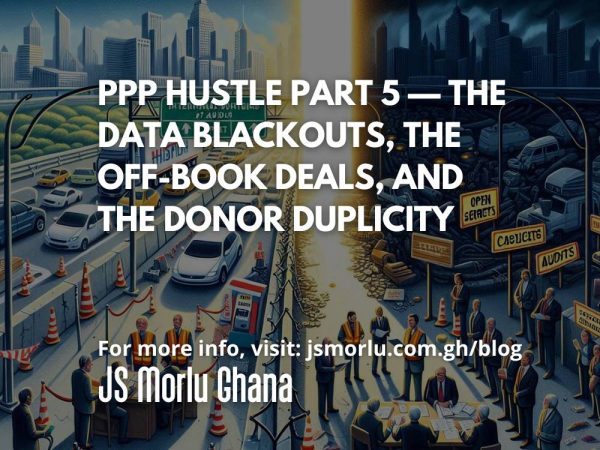By: Thelma Abbe
The Data Blackouts: Where the Numbers Go to Die
In the world of PPPs, the absence of data is often not a bug — it’s the feature. Governments enter billion-dollar partnerships but lack the systems to monitor performance, track revenue, or even confirm project existence.
In West Africa, a national toll road collected millions annually, yet no public database existed to track vehicle volumes, toll revenues, or maintenance schedules. Requests for information were met with: ‘Reconciliation is ongoing.’
In Southeast Asia, a healthcare PPP promised universal access and better health outcomes. But the government didn’t require the private operator to submit service data — just invoices.
In Southern Africa, an ICT backbone PPP launched with claims of connecting 10,000 institutions. Five years later, no centralized reporting dashboard existed. Independent researchers found data only on 1,100 active nodes.
In the Caribbean, a national ID PPP had no public statistics on how many cards were issued, where they were distributed, or who had access. Annual reports omitted performance indicators.
No dashboards. No KPIs. No evidence. Just vibes and payments.

The Off-Book Deals: PPPs Without a Paper Trail
Some PPPs are never officially procured, debated in parliament, or published in the gazette. They exist only in executive memos, cabinet communiqués, or obscure MoUs — but still receive billions in public guarantees.
In Central Africa, a digital surveillance PPP was awarded as a ‘national security exception.’ Parliament never saw the contract. Civil society only learned of it when journalists discovered the financing in a foreign development bank loan portfolio.
In the Middle East, a prison construction PPP was embedded inside a bilateral cooperation agreement. No procurement, no public debate, yet the repayment obligations fell on taxpayers for 25 years.
In East Africa, a hospital PPP worth $300 million was signed under a presidential directive without a single competitive bid. Budget allocations appeared in supplementary budgets under ‘special strategic projects.’
In South America, an airport expansion PPP was contracted via a diplomatic protocol. The contract was not subject to national procurement rules, and no citizen consultation was conducted. Yet the airport increased departure taxes by 60% to recover private capital.
These off-book deals evade oversight by design — and accountability is impossible when no one even knows a contract exists.

The Donor Duplicity: Aid That Enables Abuse
Multilateral banks and bilateral donors have increasingly pushed PPPs as solutions to infrastructure gaps. But they often fund feasibility studies, provide guarantees, or promote ‘PPP Units’ — even when transparency is lacking.
In East Africa, a donor-funded PPP hospital received World Bank-backed viability gap financing — despite repeated Auditor General concerns about costs and accessibility.
In South Asia, a transport PPP backed by a European development agency was signed without competitive bidding. When civil society groups objected, the donor said: ‘The process met our internal safeguards.’
In West Africa, a waste-to-energy PPP financed by an EU trust fund was awarded to a politically connected firm. The project stalled. Donor officials said, ‘It was a pilot to test the concept.’ The government absorbed the $40 million debt.
In Southeast Europe, an energy efficiency PPP funded by a development bank included loan terms that prevented the government from cancelling the deal for 10 years — even though performance targets were not met.
Donors often promote risk-sharing mechanisms that socialize public losses while insulating private investors. It’s PPP: Public Pays Permanently — with donor blessings.

The Cost of Secrecy
When PPPs operate in the dark, citizens pay three times:
1. Once for the inflated cost.
2. Again when the project underperforms.
3. And forever when repayments are locked into budgets for decades.
In South America, a highway PPP with no independent audit added $500 million in cost overruns. The debt was passed down through fuel taxes.
In West Africa, a government continued paying a private school PPP even after the schools were shut down during conflict. The contract didn’t have a force majeure clause.
Transparency isn’t a luxury — it’s the only defense against disaster. When governments sign billion-dollar contracts without data, debate, or disclosure — democracy is bypassed.

What Must Be Done Now
1. Mandatory PPP registries: All PPPs must be published with full contract summaries, performance indicators, and fiscal commitments.
2. Donor accountability: International financial institutions must align their funding with transparency and oversight benchmarks — not just bankability.
3. Data transparency laws: Require private partners to disclose operational and financial data as a condition of contract.
4. Public audit rights: Auditors must be empowered to investigate all PPPs — regardless of their classification or donor involvement.
5. Civil society engagement: Contracts over a defined threshold should require public consultation and citizen review.
6. Sanctions for nondisclosure: Withhold funding or cancel guarantees when transparency obligations are violated.

Final Word: PPPs in the Shadows Are PPPs for the Powerful
When data disappears, documents vanish, and donors look away — PPPs become tools for wealth extraction, not public service.
True partnership demands light. Anything else is a hustle — hiding in the dark, paid for by the public, rubber-stamped by donors.
These types of PPPs don’t fail because of poor planning. They thrive because secrecy, silence, and selective memory keep the scam alive. They are engineered not for delivery — but for diversion.
A deal that cannot be published is a deal that should not be signed. A project that cannot be monitored should not be funded. A contract that cannot be questioned is not a public agreement — it’s a private agenda.
If citizens are asked to foot the bill, they have every right to read the terms, follow the money, and measure the results.
Governments must remember: they are custodians of public trust, not accomplices in backdoor dealings. And donors must decide: will they fund development — or quietly enable dysfunction?
If a PPP can’t survive daylight, it shouldn’t exist at all. Because in governance, darkness is not strategy — it is surrender.

Author: Thelma Abbe
Email: abbe.thelma@jsmorlu.com
Thelma Abbe is a dynamic accounting professional with JS Morlu Ghana, where she delivers high-impact financial services to U.S. and international clients with precision and strategic insight. A graduate of Kwame Nkrumah University of Science and Technology and a current ACCA candidate, she combines academic excellence with real-world expertise.
With deep command of both U.S. GAAP and international accounting standards, Thelma manages complex IRS filings, financial reporting, and compliance for a global client base. Her ability to bridge multiple regulatory environments makes her a vital asset to cross-border businesses navigating today’s financial complexities.
She also plays a critical role as a subject matter expert and product tester for FinovatePro.com — an AI-powered, game-changing accounting platform built to transform financial management for small businesses around the world.
Driven by a passion for accountability, financial innovation, and governance, Thelma is a constant learner and avid reader of corporate finance literature. She stands at the forefront of a new generation of accountants — globally minded, tech-savvy, and purpose-driven. For professional inquiries, reach her at abbe.thelma@jsmorlu.com.
